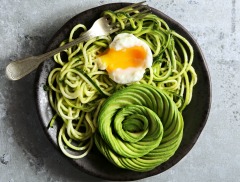Don't just meal plan... meal plan intelligently - with Meal Genius! Sign up for our free newsletter to get delicious recipes, sample meal plans and a whole lot more!
Jerusalem Artichoke (Sunchoke)
Jerusalem artichoke, better known as sunchoke, is a root vegetable from the sunflower family with a sweet and nutty taste and a profile similar to potatoes. Don’t let its name confuse you: it is neither from Jerusalem nor an artichoke, but it does store inulin, the carbohydrate found in artichoke, in its tuber roots.
Inulin does not have much of an effect on blood sugar levels and therefore is a diabetic-friendly carbohydrate. It also helps the absorption of calcium necessary for bone health. Inulin also breaks down fructose in the gut and provides prebiotics that fight harmful bacteria in the intestines and prevent constipation.
On top of the benefits from inulin, the sunchoke’s roots are popular as they can be consumed raw or cooked and are a great source of iron, thiamin and potassium. It does, however, cause flatulence in some people, gaining another nickname in the culinary world: the fartichoke.
Glycemic Load= 11
The Benefits
- Special diets: Autoimmune Paleo Diet, Elimination Diet, Gluten-Free Diet, Gluten-Free/Dairy-Free Diet, Grain-Free Diet, Low Acid Diet, Low FODMAP Diet, Low Histamine Diet, Low Oxalate Diet, Low Starch Diet, Paleo Diet (Light), Paleo Diet (Strict), Pescetarian Diet, Primal Diet, Vegetarian Diet, Whole Food
- Excellent Source of: Iron, Thiamin
- Good Source of: Potassium, VitaminC, Copper, Phosphorous
- Preferences: No Coconut, No Pseudograins, No Fish, No Red Meat, No Pork, No Eggs, No Shellfish, No Gluten, No Nuts, No Seeds, No Soy, No Dairy, No Poultry, No Corn, No Yeast, No Peanuts, No Grains, No Molds, No Legumes, No Nightshade, No Citrus, Low Cholesterol, Low Fat, Low Sodium, Low Saturated Fat
Related Foods
Selecting and Storing









